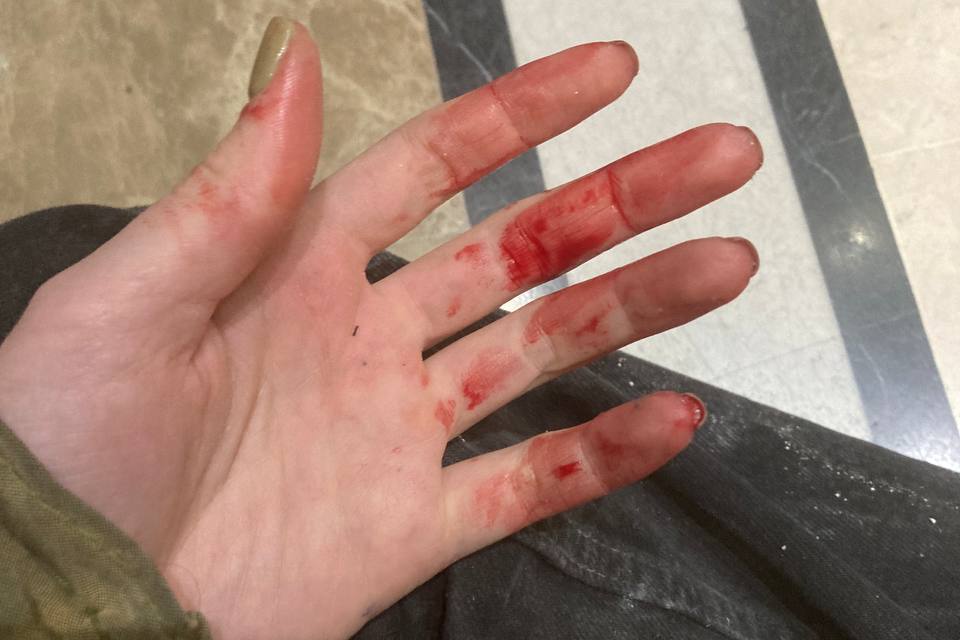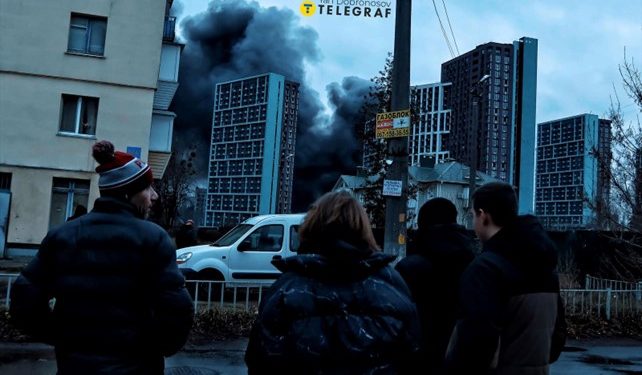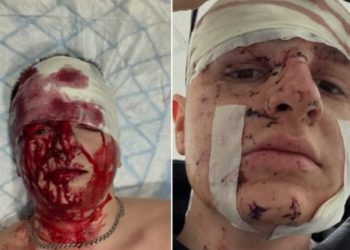The last days of 2023 and the first days of 2024 became one of the most tragic in the full-scale war wages by Russia with unprecedented cruelty against Ukraine. In just five days, from December 29, 2023, to January 2, 2024, as a result of Russian missile attacks, three journalists were wounded and injured, and four newsrooms and three journalists’ apartments were damaged. This happened in four regions of Ukraine at once.
The International and European Federations of Journalists (EFJ and IFJ) and the National Union of Journalists of Ukraine (NUJU) condemn Russian attacks on Ukrainian cities and express solidarity with media workers.
The network of Journalists’ Solidarity Center created by the NUJU promptly processes and verifies information about journalists and mass media in need of assistance. At such moments, the value of the Centers, which work with the support of the IFJ, EFJ, and UNESCO in six cities of Ukraine, is especially relevant.

As of January 3, it was confirmed that as a result of missile fire:
- 3 apartments of 5 journalists were damaged:
The family of Kyiv TV workers Olena and Viktor Sinkevyches lost their apartment, belongings, and their car. They only managed to grab the documents and miraculously survived the Russian missile attack on Kyiv on January 2. The journalistic community of Ukraine organized a fundraiser to support the injured colleagues.

For the third time, explosive waves blew out the windows in the apartment of a journalist of the media holding, Nashe Misto, from Dnipro, Daryna Sukhonis.
“It could seem that we must have already gotten used to it [such attacks], but the missile attack on December 29 was the worst in Dnipro since the beginning of the full-scale invasion,” Daryna said in a comment to the NUJU. “Everything was on fire outside the window. We could see black smoke… Ambulances… Bodies on the streets… I’m glad that my loved ones and I survived despite such circumstances.”

A missile attack on Kharkiv damaged the apartment of a journalist couple, Oleksandr Manchenko, a correspondent for the Slobidskyi Krai publication, and Valeriya Yemets, a journalist of Suspilne Kharkiv.
“On December 31, at 0:58 a.m., a Shahed UAV hit an area in front of my house,” Oleksandr Manchenko told the NUJU. “I even was “lucky” to see the hit directly. The explosive wave shattered the glass in two windows and damaged the walls of the apartment. The wave also knocked out the frames of all the windows (they are remaining in place, not falling out, but at the same time, they are shaking quite a lot). In the bathroom, due to the explosion, a wall cabinet fell and damaged the sanitary ware.”

- 3 journalists and media workers were wounded and injured:
Obviously, these days, Putin’s Russia inflicted the most terrible blows on the largest city in the east of Ukraine – Kharkiv; hence, the third front-line Journalists’ Solidarity Center, opened in this city in December by the NUJU with the assistance of the UNESCO headquarters, has been undergoing a peculiar strength test.

Two employees of the German television group ZDF were wounded during the Russian missile attack on the Kharkiv Palace Hotel. In total, the film crew consisted of seven people, led by reporter Alica Jung.

“There, I can hear an incredibly loud thump; the building is shaking. I am on the fifth floor of the Kharkiv Palace Hotel. When I open the door to my room, what I see is not a large open lobby as usual but darkness and black smoke. I don’t know if my colleagues are still alive and which part of this building is still intact,” the journalist said during a live television broadcast from Kharkiv.
Svitlana Dolbysheva, the Ukrainian producer of the ZDF television group, was one of the victims.
“My colleagues and I finished work and agreed to meet at 7 p.m. in the lobby of the hotel to go to have dinner. I got dressed, went down to the first floor, and sat down to wait for my colleagues. Now, I scroll through separate frames in my memory as the pieces of this entire atrium are falling. I was thrown back by the explosive wave. I began to crawl, and there was a second hit, which made everything fall even faster, and then something big fell on me. I was very scared then,” said Svitlana to the NUJU information service.

She managed to get out from under the rubble; she ran to the shelter, which was the hotel’s underground parking. Svitlana recalls how her condition worsened every minute. As doctors found out later, she had received a mine-explosive head injury, a cut, a concussion, fractured vertebrae, ribs, contusion and bruised lung, pneumothorax, and more bruises all over her body.
“I started feeling severe pain, and I was in such a state that I could faint. But the hotel staff approached me. They took me by the hand. We barely got to the underground parking. There, I saw my colleagues, who were also in a panic; they were OK,” recalls Svitlana.

Among her colleagues, Svitlana could not see a foreigner working as a security guard on their team (he asked not to be named). Later, it turned out that he was also wounded. The doctors operated on him – some fragments were found in his ears… The man will have another operation in two months.
“This is just another Russian attack on the free press. We hope that the injured colleagues will recover quickly,” says ZDF editor-in-chief Bettina Schausten.
The Russian Defense Ministry said that the strike on the hotel targeted “representatives of the main intelligence service and the Ukrainian armed forces.” The head of the German Federation of Journalists (DJV), Mika Beuster, called the Russian Defense Ministry’s justification “inhuman and cynical.”
“We journalists are neither an intelligence service nor a warring party, but independent observers of events,” Beuster said.
On December 29, the editor of the Lviv news agency Vholos, Pavlo Dak, received a head injury despite the fact that he was in shelter during the missile attack on the city.
“Two explosions rang out. The second was much stronger than the first. There was a powerful, terrible shock wave. The walls of the shelter shook, plaster and small cement rocks fell from the ceiling,” the journalist recalls. “I thought that the house above the shelter would now fall. I felt a sharp blow to my back and fell forward, hitting my forehead on the tile floor. Of course, I was in shock. This has never happened to me before.”

- 4 newsrooms were damaged:
Among the media newsrooms damaged as a result of Russian shelling on New Year’s Day were Suspilne Kharkiv and Ukrainian Radio Kharkiv, Media Group Obiyektyv (Simon TV and radio company, Kharkiv), media project NV (website, magazine, and radio NV, Kyiv).
The office of the Obiyektyv media group is located in the Kharkiv Hotel – just opposite the Kharkiv Palace Hotel.
The Obiyektyv newsroom suffered from Russian shelling twice. The first missile hit took place in March 2022. And after the attack on the evening of December 30, 2023, it became impossible to work indoors. Equipment, computers, and furniture were damaged.
“Since the beginning of the full-scale invasion, the journalists of the Obiyektyv media group mostly work remotely; the news on the Simon TV channel, which is part of the media group, no longer appears,” said the editor of Obiyektyv, Olena Nahorna, in a comment to SPILKA News. “With a limited team, we fill the news feed on our website, shoot videos… The footage director remained working in the office. Fortunately, he was not at work when it was hit. The entire office is covered with glass.”

In Kharkiv, as a result of the Russian missile attack on December 30, the Radio House – the offices of Suspilne Kharkiv and Ukrainian Radio Kharkiv – were also damaged. In the building, the windows were blown out, and the heating system, doors, and walls were damaged,” says the manager of Suspilne Kharkiv, Yevheniya Kolienova.
“We made a room where journalists could work during blackouts; we just finished the renovation, and we didn’t even have time to furnish it. The glass in the room was broken, the ceiling was damaged. The heating system was damaged… The ceiling was actually destroyed, and the windows that we boarded up were also destroyed – the windows were broken even after the first attack of the Russian Federation on this area, now – it’s really bad. It is now dangerous to stay in this room. The rooms facing the yard were badly affected. The yard is also damaged,” says Yevheniya Kolienova.
The media team works remotely; at the time of the explosion, there was only a security guard in the building, but he managed to hide in the shelter.

At the same time, despite the extreme conditions, Ukrainian journalists continue to fulfill their professional duty, including covering Russian attacks on Ukrainian cities.
“From the very morning of January 2, I called a taxi and drove in the direction of the smoke,” says Kyiv photojournalist Yan Dobronosov. “Somewhere in Obolon (a district in Kyiv, – Ed.), he got out of the taxi and, as it turned out, he was not close to being hit at all. Of course, I ran on foot, and as I ran, the air defense system started to work. And a minute later – before my eyes, a missile flew over the fence,” said the photographer on the social network.
He saw the blast and was glad to the fact that he remained alive.
“And after that, as in a terrible dream, everything began to fly – stones, windows, some dirt,” recalls Yan Dobronosov. “And all that was around me. Five minutes later, I was able to shoot the first video… God loves me.”

The NUJU expresses its solidarity with the colleagues-victims of the attacks. Mass missile attacks on peaceful cities sow destruction and death and are another Russian war crime, according to Sergiy Tomilenko, the President of the NUJU.
“We admire the courage and professionalism of all colleagues who, in conditions of increased danger, continue to spread news from the attacked Kharkiv, Zaporizhzhia, Odesa, Dnipro, and Kyiv… Through the network of the NUJU‘s Journalists’ Solidarity Centers, we study the needs of injured journalists and media newsrooms. In the near future, we will provide emergency assistance to our colleagues,” Sergiy Tomilenko notes.

The terrible New Year’s attacks were reacted to in Brussels at the headquarters of the International and European Federations of Journalists.
“We stand in solidarity with all the journalists and media workers in Ukraine who continue to work despite fear and difficult material conditions. This is possible thanks to the Journalists’ Solidarity Centers‘ network (JSC) set up by the NUJU, which provides emergency assistance to journalists and media outlets. This work is of vital importance”, said EFJ General Secretary Ricardo Gutiérrez and IFJ General Secretary Anthony Bellanger.
About JSC network
The work of the network of Journalists’ Solidarity Centers was launched in April 2022 in three cities of Western Ukraine – Lviv, Ivano-Frankivsk, and Chernivtsi. In July 2022, the network’s head office in Kyiv and front-line Centers in Dnipro and Zaporizhzhia were created additionally. In December 2023, a new front-line JSC in Kharkiv was founded under UNESCO‘s International Program for the Development of Communication and the People of Japan and by the NUJU, EFJ, and the IFJ.
NUJU Information Service

 THE NATIONAL UNION OF
JOURNALISTS OF UKRAINE
THE NATIONAL UNION OF
JOURNALISTS OF UKRAINE
















Discussion about this post